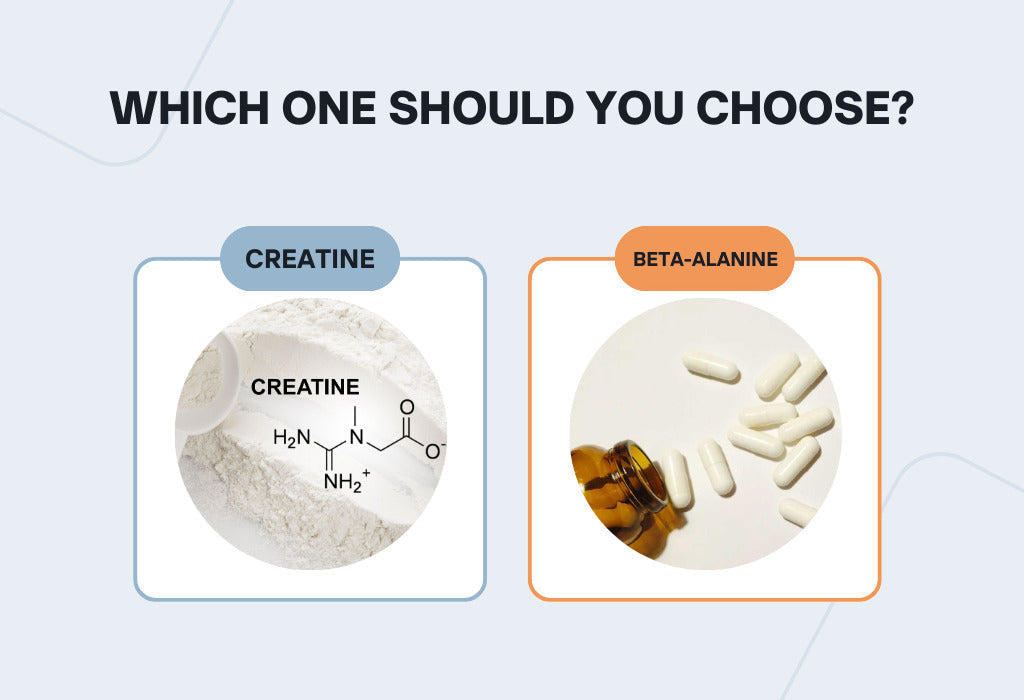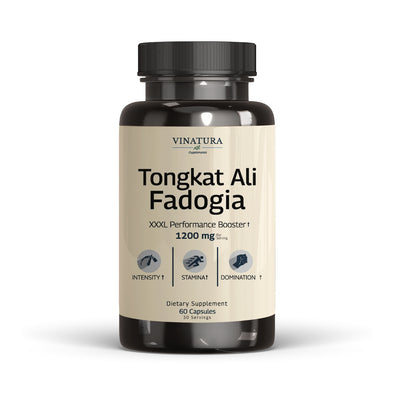
Creatine or Beta-Alanine: Which One Should You Choose?
Choosing between creatine and beta-alanine depends on your fitness goals. Creatine supports strength, power, and lean muscle gains, while beta-alanine helps reduce fatigue during high-intensity exercise by buffering acid in the muscles. Both are effective, safe for most users, and serve different roles in performance. This article compares their key benefits, differences, and ideal use to help you decide which one—or both—best fits your routine.
Before exploring further, please read the disclaimer located at the end of this webpage.
Key Takeaways
- Creatine is commonly used to support muscle performance and endurance capacity. The amount that can be supplemented for maintenance is 3 - 5 grams/day.
- Beta-alanine may buffer muscle acidity during intense activity, which can aid endurance. Recommended intake: 3.2–6.4g per day.
- You can combine creatine and beta-alanine for better results, but follow dosage guidelines from your doctor or nutritionist to ensure safety.
What Is Creatine?

Creatine is a nutrient made up of 3 different amino acids, mainly found in the liver, kidneys, pancreas, muscles and brain. The form of creatine that appears in the body is phosphocreatine.
Normally, humans can supplement enough creatine (about 1 - 2 grams/day) through foods such as red meat (beef, lamb), organs (liver), seafood, milk or dairy products, etc.
However, for those who exercise at high intensity (such as athletes), of course, they must look for supplements (such as powders, capsules/tablets, liquids, energy bars) to raise creatine levels further, thereby nourishing and increasing muscle strength and endurance [1,2].
What Is Beta-Alanine?

Beta-Alanine is a non-essential amino acid that the body produces itself. This nutrient can help increase the amount of carnosine - a compound that plays a role in improving muscle endurance to improve exercise capacity and strength, to improve exercise capacity and muscular strength.
Similar to creatine, you can also supplement beta-alanine through foods such as meat, fish, poultry, ... but of course it is not enough if you want to exercise at high intensity [3,4].
Because the effects are somewhat similar, many people are interested in choosing creatine or beta-alanine which is more suitable for them. Let's learn in detail how each substance "works" in the body.
At the same time, you understand the advantages and limitations of each substance so that you can choose the right supplement for you, increasing the effectiveness of your workout.
Learn more: Can You Take HMB And Creatine Together?
Creatine vs Beta-Alanine: Mechanisms of Action
Creatine is a nutrient that supports anaerobic energy production, which may enhance protein synthesis in muscles and help maintain focus and neuromuscular function [5].
Specifically, creatine helps increase phosphocreatine (PCr) levels - this is a source of raw materials commonly used to regenerate ATP (energy) for muscles [6].
In addition, creatine stimulates muscle growth through the osmotic effect so that the brain transmits mTOR signals - a regulator of protein synthesis, to each part more effectively, thereby positively affecting muscle biosynthesis processes [7].
Creatine even changes the release of myokines (proteins that play a role in muscle growth) to promote muscle cell formation (myogenesis) [8].
As for beta-alanine, this nutrient is a precursor of carnosine, a dipeptide in skeletal muscle. When entering the body, this ingredient will act as a buffer to neutralize H+ ions created during high-intensity exercise.
Thereby, it can slow down the fatigue process and increase strength and endurance for the exerciser [9].
In general, although they both aim to improve endurance and muscle strength, the approach and impact of each substance are different.
While creatine helps nourish muscles from within, beta-alanine is temporary, only helping to stabilize H+ levels when muscles are exercising at high intensity.
Benefits of Creatine vs Beta-Alanine

In addition to its most obvious use of improving endurance and muscle strength, creatine also brings many more benefits. Including support for muscle strength and mass, enhanced focus and cognitive performance, faster post-exercise recovery, and help in maintaining healthy blood sugar and cardiovascular function [1].
Beta-alanine primarily works by increasing carnosine levels in muscles, which helps buffer acid buildup during intense activity. This may reduce muscle fatigue and support performance in short-duration, high-intensity exercise. Some research also suggests potential benefits for cognitive function, mood, and overall brain health [10].
Food Sources and Supplementation
Users can supplement the necessary amount of creatine through red meat, dairy products, tuna, cod, herring, pork, fish, etc. Similarly, beta-alanine is found in abundance in beef, pork, poultry, fish, etc.
However, for those who need to exercise intensely and for a long time, they may not be able to meet the necessary needs and must consider using additional functional foods as prescribed by a doctor or nutritionist.
At the same time, you should note that the appropriate dose of creatine is 3 - 5 grams/day [11] and beta-alanine is about 3.2 - 6.4 grams/day [12].
Comparison: Creatine vs. Beta-Alanine
|
Feature |
Creatine |
Beta-Alanine |
|
Primary function |
Increases phosphocreatine stores in muscles to rapidly regenerate ATP |
Increases muscle carnosine levels to buffer acid and delay muscle fatigue |
|
Molecular structure |
C₄H₉N₃O₂ (a nitrogenous organic acid) |
C₃H₇NO₂ (a non-essential beta amino acid) |
|
Main benefits |
|
|
|
Exercise type |
|
|
|
Side effects |
|
|
|
Food sources |
|
|
Synergy and Stacking
To maximize muscle strength and endurance, many people wonder if it is possible to combine these two substances together. In fact, there is research confirming that combining creatine and beta-alanine can increase endurance performance after 4 weeks [13].
However, each person's body's reaction is different, so some cases can be used but some other cases cannot. Therefore, before using any functional food for the body, you should contact your doctor or nutritionist for detailed advice.
Safety and Side Effects
Creatine is considered safe for everyone who wants to improve their physical fitness. However, prolonged high doses without proper guidance may lead to side effects, may lead to side effects such as stomach pain, cramps, dehydration, etc.
At the same time, beta-alanine also causes unwanted side effects when overdosed such as burning, itching, reduced taurine absorption, etc.
Conclusion
Hopefully, through the sharing in the article, you can distinguish between creatine and beta-alanine. From there, you can choose the right product for you to improve endurance and muscle strength. Or you can combine both, with the dosage prescribed by your doctor or nutritionist for optimal results. But no matter what type of functional food you use, you must pay attention to exercise and eat scientifically to bring the expected useful effects.
Testimonial Disclaimer
*The testimonials presented on this website are provided by individuals based on their personal experiences with our products. These testimonials represent individual opinions and experiences, which may not be typical or applicable to all users of our products. Results may vary depending on a variety of factors, including individual health, lifestyle, and adherence to product usage instructions.References
- [1] Clinic, C. (2018, January 5). Creatine is one of your body’s natural energy sources for muscle contraction. Many athletes take creatine supplements to increase strength and improve recovery. Retrieved May 18, 2025, from Cleveland Clinic website: https://my.clevelandclinic.org/health/treatments/17674-creatine.
- [2] Creatine. (2025). Retrieved May 18, 2025, from Mayo Clinic website: https://www.mayoclinic.org/drugs-supplements-creatine/art-20347591.
- [3] Semeco, A. (2023, July 5). Beta-Alanine — A Beginner’s Guide. Retrieved May 18, 2025, from Healthline website: https://www.healthline.com/nutrition/beta-alanine-101
- [4] McMillen, M. (2013, January 22). Beta-alanine. Retrieved May 18, 2025, from WebMD website: https://www.webmd.com/vitamins-and-supplements/beta-alanine-uses-and-risks
- [5] Bonilla, D. A., et al. (2021). Metabolic Basis of Creatine in Health and Disease: A Bioinformatics-Assisted Review. Nutrients, 13(4), 1238–1238. https://doi.org/10.3390/nu13041238
- [6] Kreider, R. B., & Stout, J. R. (2021). Creatine in Health and Disease. Nutrients, 13(2), 447. https://doi.org/10.3390/nu13020447
- [7] GA, P. Am. (2017). Clinical pharmacology of the dietary supplement creatine monohydrate. Pharmacological Reviews, 53(2). Retrieved from https://pubmed.ncbi.nlm.nih.gov/11356982
- [8] Farshidfar, F., Pinder, M. A., & Myrie, S. B. (2017). Creatine Supplementation and Skeletal Muscle Metabolism. Current Protein and Peptide Science, 18(12). https://doi.org/10.2174/1389203718666170606105108
- [9] Culbertson, J. Y., et al. (2010). Effects of Beta-Alanine on Muscle Carnosine and Exercise Performance. Nutrients, 2(1), 75–98. https://doi.org/10.3390/nu2010075
- [10] Geng, C. (2022, May 30). What does beta-alanine do? Retrieved May 18, 2025, from Medicalnewstoday.com: https://www.medicalnewstoday.com/articles/what-does-beta-alanine-do
- [11] LeWine, H. E. (2024, March 20). What is creatine? Harvard Health. Retrieved May 18, 2025, from https://www.health.harvard.edu/exercise-and-fitness/what-is-creatine-potential-benefits-and-risks-of-this-popular-supplement
- [12] Trexler, E. T., et al. (2015). ISSN position stand: Beta-Alanine. Journal of the International Society of Sports Nutrition, 12(1). https://doi.org/10.1186/s12970-015-0090-y
- [13] Samadi, M., et al. (2022). Effects of Beta-Alanine with Creatine on Military Performance. IJERPH, 19(13), 7992. https://doi.org/10.3390/ijerph19137992
Author

Product Disclaimer
Including an ingredient or study does not evaluate, endorse, or recommend any Vinatura product or any third-party product. Some ingredients discussed may not be used in any Vinatura product.
The content of the articles has not been evaluated by the Food and Drug Administration (FDA) and is not intended to promote or endorse any specific product. Any products sold on this website are not intended to diagnose, treat, cure, or prevent any disease.
Opinions and Endorsements
Any claims, statements, or opinions expressed in the articles are those of the author(s) and do not necessarily reflect the views or opinions of the manufacturers of the dietary supplement products. The products sold on this website are separate from the content of the articles and are not directly endorsed or associated with the information presented here.
Liability Disclaimer
The author(s) of the articles, website, and manufacturers of the dietary supplement products do not assume any liability for any potential consequences arising from the use of the information provided in the articles. Ingredient effects, dosages, and safety vary by individual, formulation, and context; some ingredients interact with medications or may be unsuitable during pregnancy or lactation. It is recommended that individuals consult with a qualified healthcare professional before making any dietary or lifestyle changes, including the use of dietary supplements.
Product Usage
Please refer to the product labels and packaging for specific usage instructions and guidelines for the dietary supplement products sold on this website.
Customer Support
For any concerns or questions regarding the dietary supplement products, please contact our customer support team, who will be more than happy to assist you.





Leave a Comment
Be the first to comment.
What do you think?